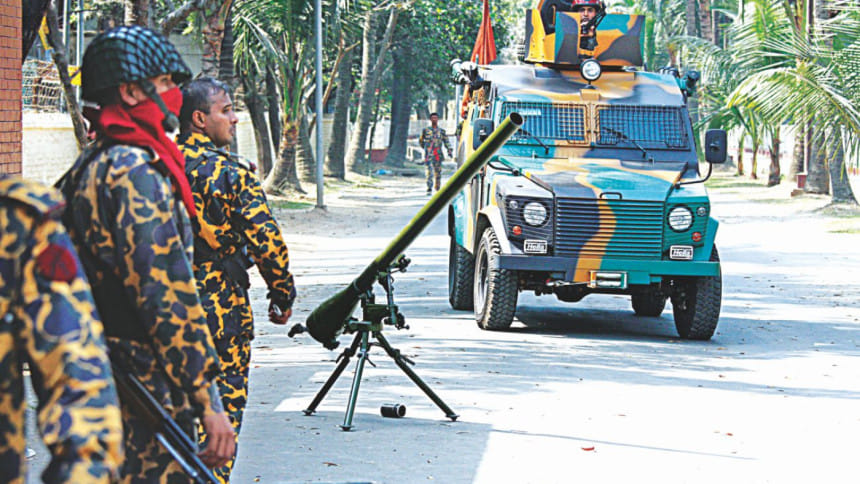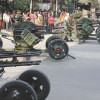Gallows only recourse

The High Court has confirmed death penalty for 139 of the 152 accused who were awarded capital punishment by a lower court for their involvement in the massacre during the BDR mutiny in 2009.
Terming the offenders “most brutal” and “cold-blooded” murderers, a three-member special bench pronounced the verdict yesterday in the biggest-ever criminal case in the country's history in terms of number of accused and people convicted.
"The most brutal, cold-blooded murderers who committed murders/crimes showing a vicious and wanton disregard for innocent human life, such individuals, by their actions, have unequivocally demonstrated that they are a threat to other members of society so long as they are alive," it said, stressing the necessity of capital punishment in this case.
"In order to ensure that the society is completely protected from these dangerous murderers, the only recourse is the finality of capital punishment," said Justice Md Nazrul Islam Talukder while delivering the judgment in a jam-packed courtroom.
"Accordingly, we are of the view that the application and imposition of death penalty as a punishment will certainly and clearly enhance the law and order situation of the country and help reduce and prevent the gruesome murders and inhuman offences of rape in the society as a whole."
The two other judges of the bench -- Justice Md Shawkat Hossain and Justice Md Abu Zafor Siddique -- agreed with the observations.
The HC bench started delivering the judgment on Sunday after it had held hearing on the death references and appeals for 370 days.
In the verdict, the court commuted death sentence of eight among the 152 to life imprisonment and acquitted four others. One died during the HC hearing of the appeals and death references.
The court upheld life imprisonment of 146 out of 160 who were handed down the sentence by the trial court. Twelve got acquitted while two had died.
The HC upheld 10 years' term for 182 out of 256 who were given one to 14 years' imprisonment.
The HC sentenced eight accused to seven years and four others to three years in jail and acquitted 29, Deputy Attorney General KM Zahid Sarwar Kazal told The Daily Star.
Three passed away during the HC proceedings.
Of the 256 accused, 28 did not file appeal against the lower court verdict and the HC did not say anything about them. Therefore, their conviction by lower court will remain in force.
Of the remaining two, each got 10 years and three years in jail. The sentences will run concurrently, meaning they will have to serve 10 years.

Now both the defence and the state can file appeals before the Appellate Division of the Supreme Court within 30 days from receiving the certified copy of the HC verdict.
The bloody mutiny on February 25-26, 2009 left the nation benumbed, as people stood aghast at the extent of the barbarity perpetrated at the Pilkhana headquarters of the paramilitary force, later renamed Border Guard Bangladesh (BGB).
On November 5, 2013, a Dhaka court awarded death sentence to 150 BDR members and two civilians, and life imprisonment to 160 others in the case.
It also handed down rigorous imprisonment of different terms, ranging from one year to 14 years, to 256 people, mostly BDR soldiers. It acquitted the remaining 278, but the government later appealed against the acquittal of 69 of them.
The HC bench scrapped acquittal of 31 and sentenced them to life imprisonment. Among them, four will have to serve seven years in jail. It upheld the acquittal of remaining 34.
A total of 185 people have now been given life term.
Replying to a query, DAG Kazal said those who got acquitted by the lower court are yet to come out of prison as they stand accused in a case filed under the Explosive Substances Act.
Around one year might be needed to execute death sentences of the convicts, if the Appellate Division confirms their convictions after hearing and disposing of their appeals on priority basis.
The HC Division of the SC may take some time for writing and releasing the full text of yesterday's verdict and then both the state and defence may move appeals before the Appellate Division.
If a special bench of the apex court is not constituted for hearing the appeals or the case proceedings are run on normal course, three to five years' time might be needed to finish the next procedures of this case, according to the state and defence lawyers.
"The apex court will then hear and dispose of the appeals. It may take another one year to deliver the final judgment and to finish the next relevant procedures even if a special bench is constituted and the proceedings are run on priority basis," defence counsel, advocate Aminul Islam, told The Daily Star.
Yesterday, the three-member bench sat at 10:53am to deliver the verdict. A number of relatives of the accused waited outside the court amid tight security.
Justice Md Nazrul Islam Talukder described establishment of BDR and its glorious role before coming up with some observations and recommendations.
He said the BDR carnage was carried out to create a political crisis and damage the country's democracy.
From the facts and circumstances of the case, it appears that there was a plot and conspiracy from either internal or external sources to overthrow the newly formed government headed by Prime Minister Sheikh Hasina, he added.
“The BDR rebels in collaboration with the others sharing their common intention and common object following a criminal conspiracy hatched in secrecy deliberately killed the army officers with a view to exterminating them from the BDR and establishing their full control and supremacy over the force.”
He went on, “No provocation, no criminal conspiracy, no dissatisfaction and no grievance can justify this sort of atrocities and massacre committed in the Pilkhana atrociously killing 74 persons, including 57 high-ups and promising army officers, unless there was a plot or conspiracy behind the BDR carnage.
“The incident is an unprecedented event in the history of crimes. By that carnage, the nation has lost some promising, bright, distinguished, luminous and outstanding army officers and it will take a long time to fill up the vacuum.”
The offences committed by the disgruntled BDR rebels are very shocking, gruesome and diabolical in nature, which cannot be accepted and tolerated by the civilised society and the same exceeded all limits of barbarism and incivility, he added.
In his observation, Justice Md Shawkat Hossain, who presided over the bench, called for bringing a change in the "colonial attitude” towards subordinates.
Sharing an experience, he said that during a visit to one of his brother's place in Rangpur in 1981, he saw an official ordering his peon to put on his socks and shoes on his feet for him. "I felt ashamed."
Attitude towards jawans should be humane, he said. "They are our men; they are brothers and sons of somebody.... We can go a long way if we get rid of the colonial attitude."
After the pronouncement of the verdict, Attorney General Mahbubey Alam said now the convicts can appeal to the SC.
Replying to a question, he said if the death-row convicts file appeals, the process of execution will be automatically halted. He, however, avoided a reply when asked if the government will appeal against the acquittal.
Defence lawyer Aminul Islam told reporters that he will advise his clients to file appeals after going through the full text of the judgment.
SEVEN-POINT HC RECOMMENDATIONS |
|
BGB members should not carry out any programme like Operation Dal Bhat which hurts their pride and self-respect |
|
BGB should not take up any programme that gradually results in degeneration of soldierly attitude and behaviour of BGB members The home ministry and the authorities should provide fast decision/response to all problems of BGB members |
| BGB has to mitigate all grievances of its members, if any, still there among officers and other members. |
| BGB has to make quick payments of pending TA and DA bills, if any, to its members |
| BGB should resolve all problems relating to leave and other matters of its members |
| BGB should form a committee to probe why Rifles Security Unit failed to provide information of the massacre beforehand, and make the findings public as early as possible |


 For all latest news, follow The Daily Star's Google News channel.
For all latest news, follow The Daily Star's Google News channel. 








Comments